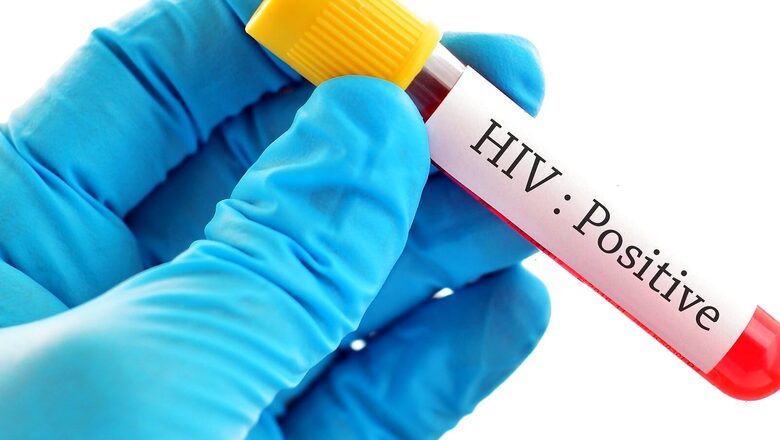
views
Sex may permeate our popular culture, but conversations about it are still associated with stigma and shame in Indian households. As a result, most individuals dealing with sexual health issues or trying to find information about sex often resort to unverified online sources or follow the unscientific advice of their friends.
To address the widespread misinformation about sex, News18.com is running this weekly sex column, titled ‘Let’s Talk Sex’. We hope to initiate conversations about sex through this column and address sexual health issues with scientific insight and nuance.
The column is written by sexologist Prof (Dr) Saransh Jain. In this article, Dr Jain will discuss the symptoms of HIV and what you can do if your partner is HIV positive.
HIV (Human Immunodeficiency Virus) is a serious virus that damages the immune system. If you or your partner has been diagnosed with HIV, it’s important to understand what the symptoms are and how to manage them and how it is transmitted so you can take steps to protect yourself and your partner. If your partner is HIV positive, there are things you can do to reduce your risk of getting HIV. There are treatments available that can help people live long and healthy lives.
What is HIV & AIDS?
It can be easy to confuse HIV and AIDS. They are different diagnoses, but they do go hand-in-hand: HIV is a virus that attacks the body’s immune system, making the person infected vulnerable to other infections and illnesses.
AIDS is the most advanced stage of HIV infection, and can be deadly and also known as stage 3 HIV.
AIDS (Acquired Immunodeficiency Syndrome) is a syndrome, or range of symptoms, that may develop in time in a person with HIV who does not receive treatment. A person can have HIV without developing AIDS, but it is not possible to have AIDS without first having HIV.
What are the symptoms of HIV?
There is no one-size-fits-all answer to this question, as HIV doesn’t always produce symptoms & the symptoms of HIV can range from mild to severe and can differ from person to person. HIV usually causes flu-like symptoms about two to four weeks after transmission. This short period of time is called acute infection. The most common symptoms include:
• Fever
• Chills & Sore throat
• Swollen lymph nodes
• Headache
• Muscle aches and pains
• Fatigue
• Rash
These symptoms can be so mild that you might not even notice them and are often mistaken for the flu or another virus. However, the amount of virus in your bloodstream (viral load) is quite high at this time. As a result, the infection spreads more easily during primary infection than during the next stage. If you experience any of these symptoms for more than 4 weeks, it’s important to see a healthcare provider right away for testing and treatment.
What to Do if Your Partner Is HIV Positive?
If you’ve just received the news that your partner is HIV positive, you’re likely feeling a range of emotions: fear, anger, confusion, and more. You may feel like you can’t trust anyone, and that you’re now living in a nightmare. This is a time when it’s crucial to have a support system. You need people you can rely on to help you through this difficult time. You also need to make sure that you’re taking care of yourself both physically and emotionally. The first step is to get tested for HIV yourself. This is something you should do as soon as possible, even if you don’t currently have any symptoms. Here are few other things you need to do in order to protect yourself and maintain a healthy relationship:
• Get educated about HIV. There is a lot of misinformation out there about HIV, so it’s important that you educate yourself on the facts. This will help you understand how the virus works and how to best protect yourself from infection. You also need to learn about HIV and how it’s transmitted. This will help you understand the risks and make informed decisions about your future.
• Use protection. If you are going to have any kind of sexual contact with your partner, it’s absolutely essential that you use protection (condoms, dental dams, etc). This will help reduce your risk of contracting HIV from your partner.
• Get tested regularly. Even if you’re using protection during sex, it’s still important to get tested for HIV regularly. This way, if you do happen to contract the virus, you can get treatment as soon as possible.
• Communicate openly and honestly with your partner. If your partner is living with HIV, it’s important that you communicate openly and honestly with them about your own risk factors and concerns. This will help you both make informed decisions about your relationship and sex life moving forward.
Can I Stay with My Partner and Protect Myself From HIV?
Yes, you can stay with your partner and protect yourself from HIV. There are a few things you can do to prevent getting HIV. The best way to prevent HIV is to use condoms the right way every time you have sex. You can also use PrEP, which is a daily medicine that can prevent HIV. If you are HIV-negative and have a partner who is HIV-positive, you can get on PEP, which is a short course of medicine that can prevent HIV if you have been exposed to it. Talk to your partner about their HIV status and how they are managing it. This will help you understand their situation and make sure that you are both on the same page when it comes to protecting yourselves.
HIV & AIDS is not a Death Sentence
The most important thing to remember that HIV is not a death sentence. With the right treatment and care, people living with HIV can live long, healthy lives. If you think you may have been exposed to HIV, or if you have any questions about the virus, talk to your doctor or a health care provider. They can help you get the information and care you need.
Prof (Dr) Saransh Jain is the winner of the Swasth Bharat Rattan Award and is a Certified and Licensed Sexologist by the American Board of Sexology. He is currently a Senior Consultant at Dr SK Jain’s Burlington Clinic in Lucknow. The views expressed in this article are those of the author and do not represent the stand of this publication.
Read all the Latest Lifestyle News here




















Comments
0 comment